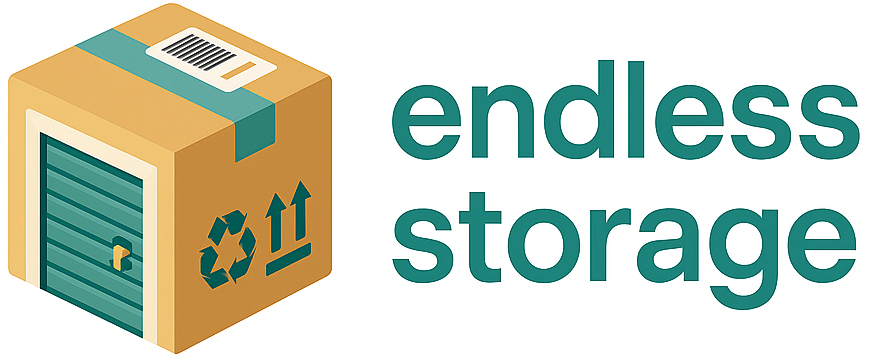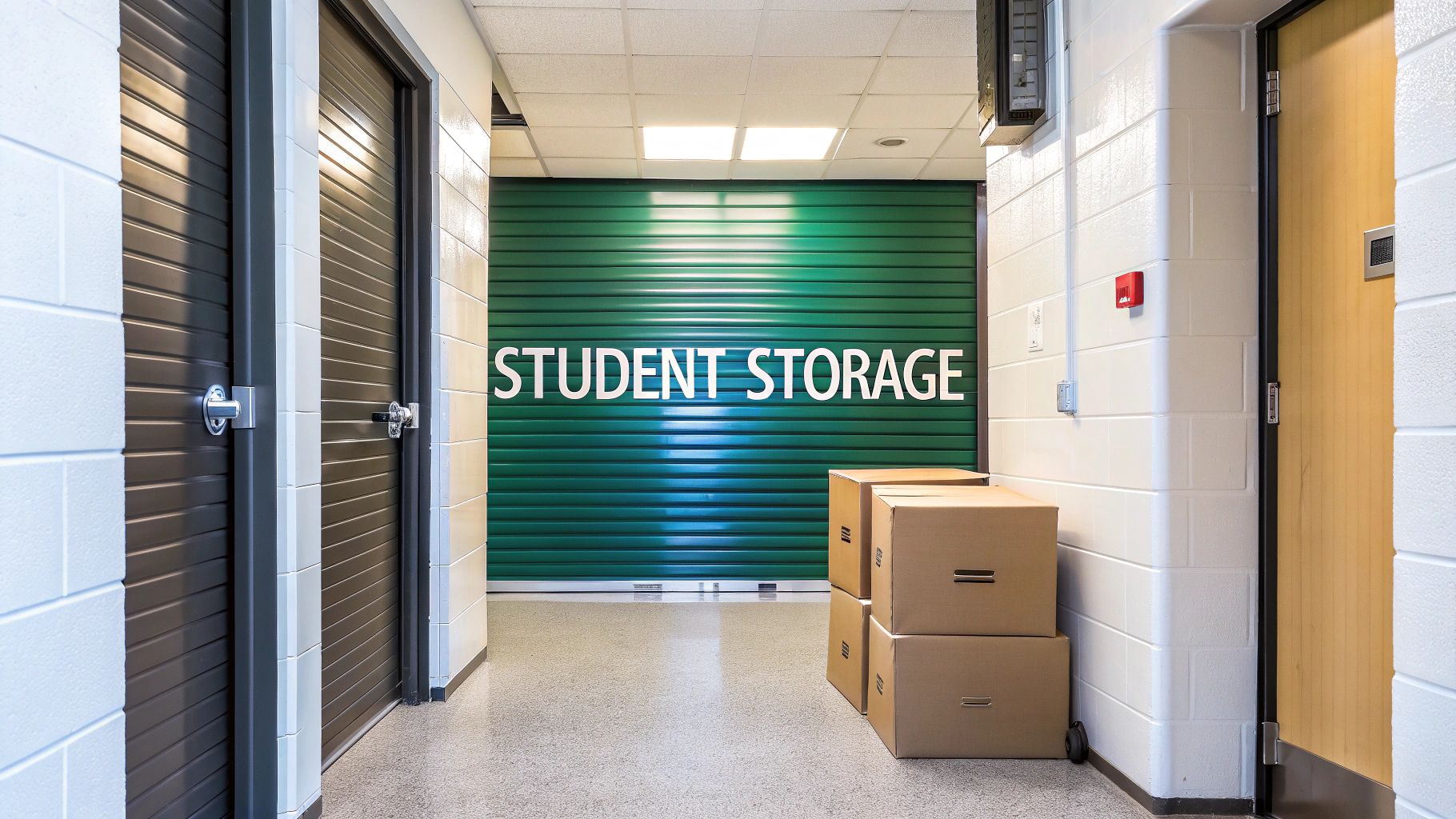Think of a student storage unit as your own personal closet, just off-campus. It's a secure space you can rent that's designed for the sometimes chaotic rhythm of college life—perfect for stashing your stuff during summer break, a semester abroad, or that awkward gap between leases.
Why Student Storage Is a Lifesaver
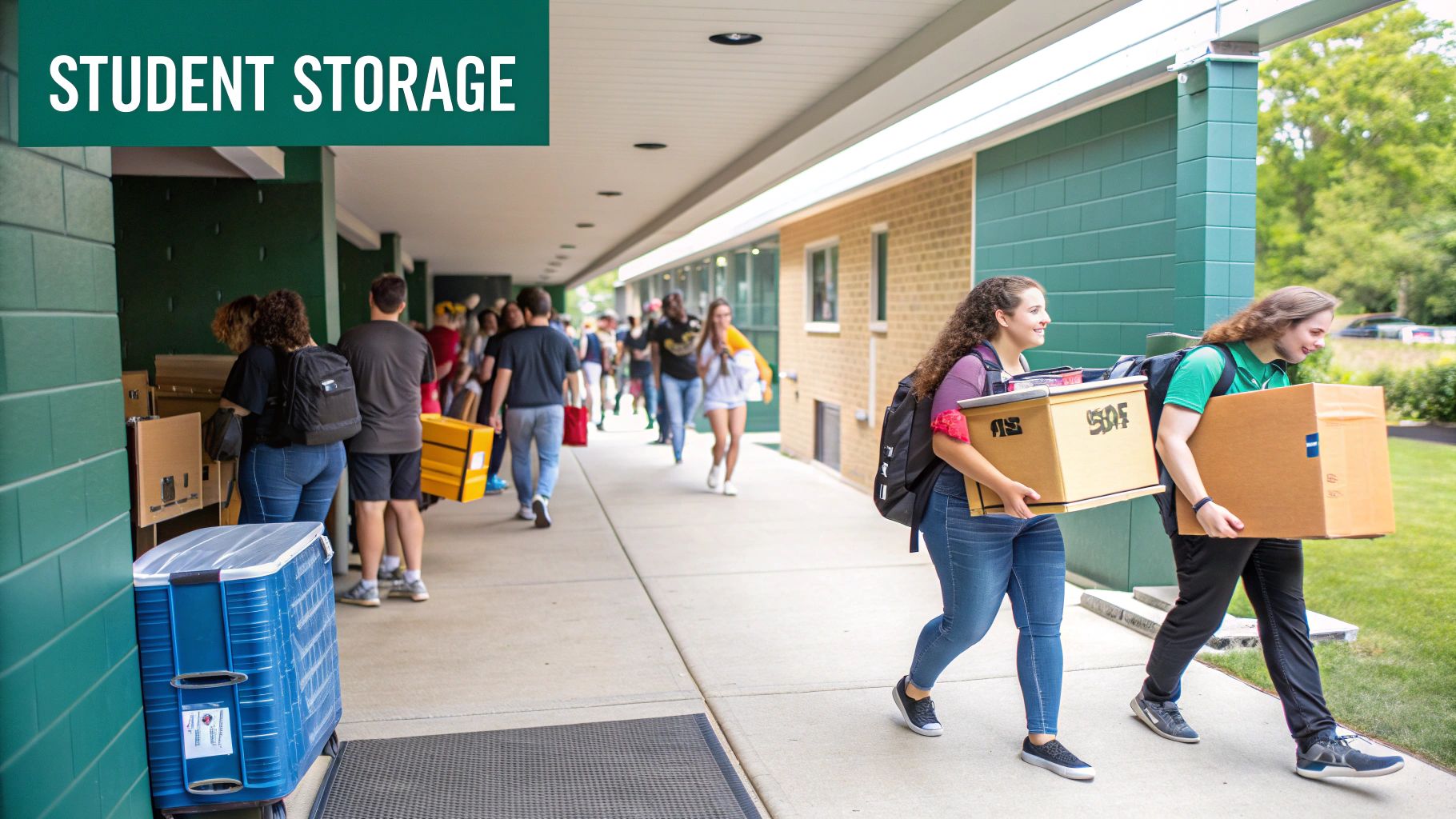
The end of the semester always brings up the same logistical puzzle: where does everything go? For too many students, the answer is a stressful, expensive trip back home with a car packed so high you can't see out the back window.
A student storage unit offers a much smarter way. It acts as a local home base for your belongings, so you don't have to haul furniture, books, and winter clothes across the state (or country) multiple times a year. It turns the dreaded move-out day into a simple trip to a secure spot near campus.
This is a game-changer in a few common student situations.
Common Scenarios for Students
- Summer Break: You can avoid cluttering up your parents' garage or basement. Better yet, all your dorm essentials are right there, ready for a quick and painless move-in next fall.
- Studying Abroad: A semester overseas is an incredible opportunity, but you obviously can't take your desk and mini-fridge with you. A storage unit keeps everything safe and sound until you get back.
- Transitioning Between Leases: We've all been there—your old lease ends a week before your new one begins. A storage unit easily bridges that gap, saving you from a frantic scramble to find a place for all your possessions.
A student storage unit isn't just about finding more space; it's about reclaiming your time and energy. It lets you focus on finals and summer plans without that nagging stress of figuring out what to do with your belongings.
By using a student storage unit, you're simplifying your life and protecting your things, from pricey electronics to essential textbooks. These spaces are built with students in mind, usually offering the flexibility and security you need. To get a better feel for what to look for, it helps to learn more about the common features of modern storage unit facilities and how they serve different needs. This little bit of homework will help you make a smart decision when it's time to pick the right option for you.
The Real Perks of Student Storage
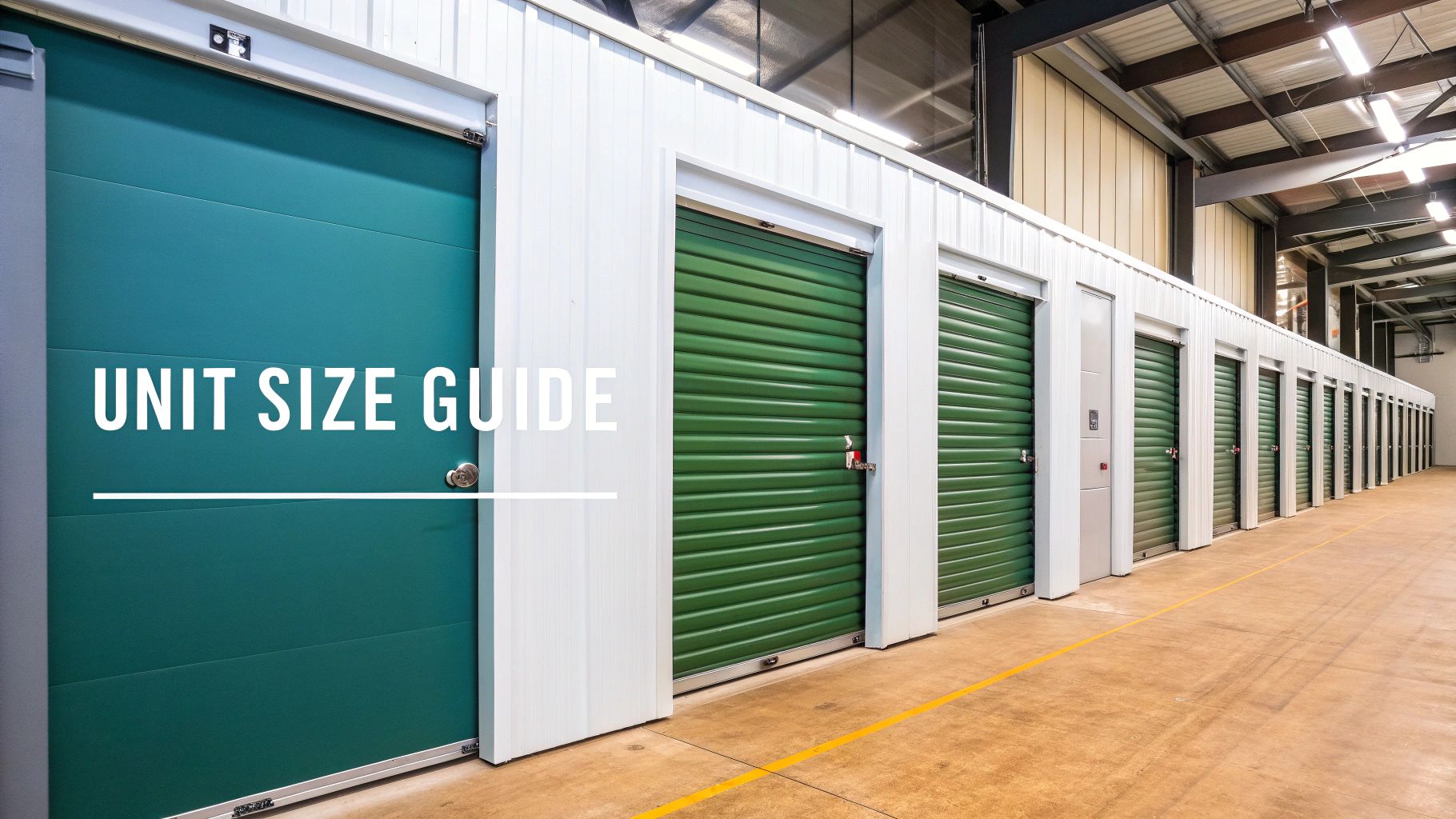
Sure, convenience is a big part of it, but the actual benefits of using a student storage unit run much deeper. It’s a smart move that saves money, protects your stuff, and honestly, just makes life easier—perks a lot of students don't even think about.
Picture this: it’s the end of the spring semester. Without storage, you're looking at renting a U-Haul or cramming everything into your car for a long, miserable drive home. Gas, time, and sheer hassle all start to add up. A local storage unit almost always ends up being the cheaper, saner option than dragging everything home just to bring it back in a few months.
More Than Just a Box
Beyond saving a few bucks, a proper storage unit gives you a level of security that your friend's basement or parents' garage just can't offer. We're talking about protecting your expensive electronics, textbooks, and furniture with features you won’t find elsewhere.
- Serious Security: Most facilities have 24/7 video surveillance, gated access, and even individual alarms on the units. Your valuables are actually safe from theft.
- Item Protection: Many units are climate-controlled, which is a game-changer for protecting sensitive items like laptops, musical instruments, and wooden furniture from brutal summer heat and humidity. Check out our guide on why self-storage with climate control matters to see if it’s the right call for you.
- Peace of Mind: Let's be real, clearing out your space at the end of the semester simplifies everything. It cuts down on the stress so you can focus on finals and actually enjoy your break without worrying about your belongings.
Using a student storage unit is about simplifying your logistics. It frees up mental energy, protects your investments, and saves you from the logistical nightmare of a cross-country move every summer.
It's no surprise this approach is catching on. The global student storage market is expected to grow from around $500 million in 2025 to a whopping $1.1 billion by 2033. This boom is all thanks to students needing flexible, secure solutions that work with the school calendar.
How to Choose the Right Storage Unit
Picking the right student storage unit shouldn't feel like a shot in the dark. It really just comes down to nailing a few key details: size, location, security, and the contract terms. Get these right, and you'll find a space that fits your stuff and your budget without any extra stress.
Let's start with size. It’s so easy to overpay for space you just don't need. A 5x5 unit, for example, is about the size of a big walk-in closet. For most students, this is the sweet spot for storing the contents of a standard dorm room—think a twin mattress, a small desk, some boxes of clothes, and that trusty mini-fridge.
Location and Security Matter
Next up, think about where the facility is located. Grabbing a unit close to campus will save you a world of hassle on move-in and move-out days. Sure, a place a few miles out of town might be a little cheaper, but you have to weigh that against the cost and headache of driving back and forth.
Security is another one you can't compromise on. You want to know your things are safe. Look for facilities that offer real peace of mind with features like these:
- Gated Access: This ensures only paying customers and staff can get onto the property.
- 24/7 Surveillance: Cameras are a great deterrent and keep a record of who comes and goes.
- Good Lighting: A well-lit facility is just plain safer, especially if you need to pop by after dark.
A quick pro-tip: think about what you're storing. If you've got electronics, wooden furniture, or important documents, a climate-controlled unit is a must. It protects your valuables from damage caused by brutal summer heat or damp, humid air.
Choosing Your Ideal Student Storage Unit Size
Still not sure what size you need? This quick guide should help you visualize what fits where, so you don't end up paying for air.
Picking the right size is the easiest way to keep your costs down while making sure everything has a home for the summer.
Understanding Your Contract and Budget
Last but not least, always, always read the fine print. When you're figuring out how to choose the right storage unit, you have to get familiar with the rental agreement. Take a moment to learn the key clauses in a lease agreement so you know exactly what you’re signing. Keep an eye out for student-friendly options like month-to-month leases that won’t lock you into a long-term commitment.
Having a clear budget is also a must. Take a look at the breakdown below to see all the financial pieces you need to consider.
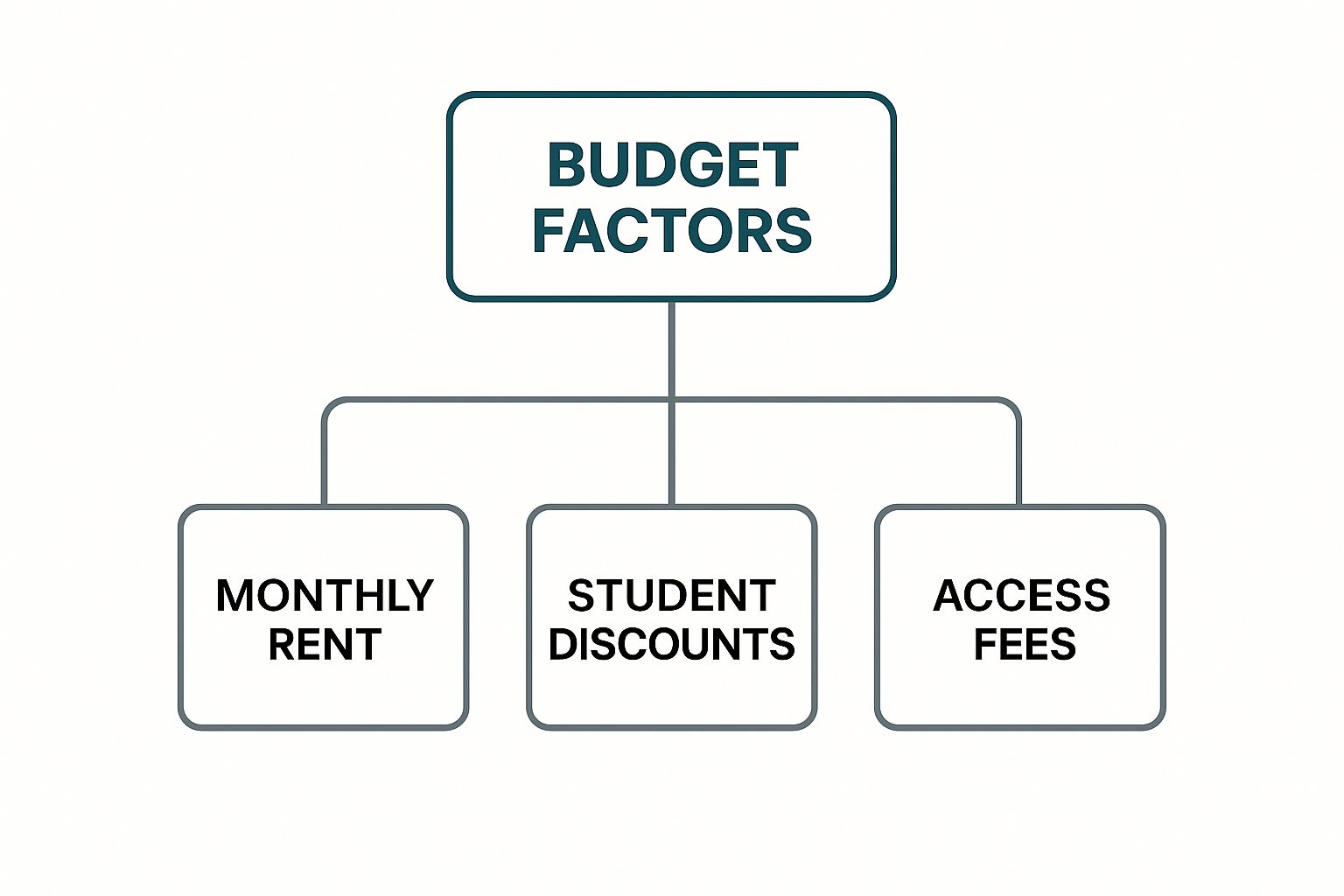
As the graphic shows, your total cost is more than just the monthly rent. Don't be shy about asking for student discounts or clarification on any access fees.
Once you’ve locked in your unit, the next step is getting everything packed up the right way. To get the most out of every square inch, check out our guide on how to pack efficiently for a move.
Understanding Student Storage Costs
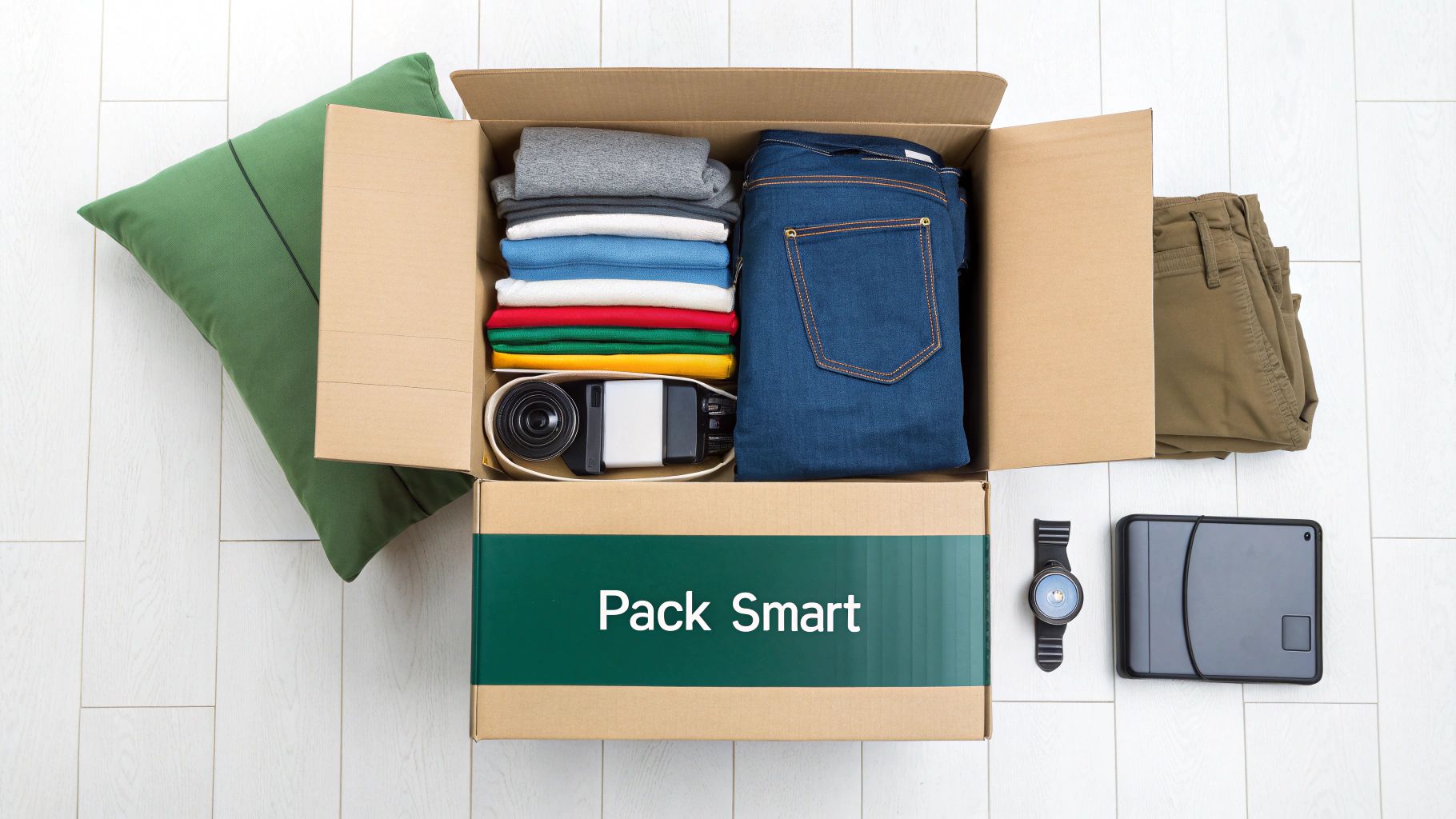
When you're trying to make a student budget stretch, that advertised monthly price for a student storage unit is really just the starting point. To avoid any nasty surprises down the road, you've got to look beyond that initial number and get the full picture of what you’ll actually be paying.
Your monthly rent is the baseline, of course, but a few things can nudge that number up. A unit in a facility right next to campus? That convenience will probably cost you more than one a few miles away. And if you need a climate-controlled unit to protect your electronics or wooden furniture from brutal summer heat, that'll add a bit to your monthly bill, too.
Uncovering Potential Hidden Fees
The final price tag often includes more than just the rent. Many storage spots have one-time or recurring fees that can catch you off guard if you aren’t looking for them. Knowing what to ask about is key to building a realistic budget.
- Administrative Fees: This is usually a one-time charge for getting your account set up and handling the paperwork. Always ask if it's rolled into the price or an extra fee.
- Mandatory Insurance: Most places require you to have insurance for your stuff. You can often buy a policy directly from them or just show proof that your own renters' or homeowner's policy covers it.
- A Quality Lock: While some facilities might throw in a free lock as a move-in special, you'll typically need to buy your own. Don't cheap out here—a solid, durable lock is your first line of defense.
Think of it like booking a flight. The ticket price is where you start, but then you have to factor in extras like baggage fees and seat selection. A storage unit works the same way—the total cost is always more than just the advertised rate.
Students and other young renters are a huge part of the storage market. In fact, millennials make up about 40% of all U.S. renters, and they typically rent smaller units for around 10 months—a perfect match for an academic year plus summer break. You can see how students are using these services and other self-storage trends.
Keeping these long-term storage tips in mind will also help you plan your budget more effectively over multiple semesters.
Smart Packing Strategies for Your Storage Unit
Nailing down the right student storage unit is a great first step, but how you pack it is what really makes or breaks the experience. Smart packing is the difference between a smooth move-out and a chaotic mess down the road. It’s all about using every square inch wisely while keeping your stuff safe for the months ahead.
Think of your unit as a game of Tetris. The goal is to create stable, interlocking rows with zero wasted space. Your best move is to use sturdy boxes of the same size. This makes stacking them a breeze and keeps those frustrating tumbles and crushed boxes out of the picture.
A golden rule of packing: heavy stuff goes on the bottom. Load up smaller boxes with textbooks and kitchenware and place them at the base of your stacks. Lighter items, like your bedding and clothes, can go in larger boxes right on top. This simple weight distribution is key to keeping your box towers from toppling over.
Organization Is Your Best Friend
Organizing your unit as you go will save you a massive headache next semester. It’s all about creating a system that makes finding things easy and sets you up for a stress-free move-in day. Before you even tape up a single box, think about what you might need to grab before school starts again.
- Create a Walkway: Always leave a narrow path down the middle of the unit. This little bit of foresight means you can get to boxes in the back without having to unpack everything.
- Label Everything Clearly: Don't just scrawl "kitchen stuff." Get specific: "Pots, Pans, and Silverware" or "Fall Sweaters." Pro tip: label each box on multiple sides. You’ll thank yourself later when you can see what’s inside no matter how it's stacked.
- Keep Essentials Accessible: Anything you might need early—like important documents or that one textbook for summer reading—should be placed right near the front of the unit for a quick grab-and-go.
The goal here is to pack with your future self in mind. A few extra minutes spent labeling and organizing now will save you hours of digging around in a panic later on.
When it comes to your delicate items, proper protection isn't optional. Electronics, dishware, and other fragile belongings need a little extra care to survive months in storage. For a deeper dive, check out our guide on the best packing materials for fragile items to make sure everything comes out in one piece. Taking apart furniture like bed frames and desks is another fantastic way to free up a surprising amount of space.
Got Questions About Student Storage? We’ve Got Answers.
Even after you’ve figured out the right size and packed a few boxes, you probably still have some questions buzzing around. That's totally normal. Getting those last few details ironed out is the final step to a completely stress-free storage experience.
Let’s walk through the most common questions students ask. This way, you can move forward knowing you’ve got all your bases covered.
Is Insurance Required for My Storage Unit?
More often than not, yes. Most storage facilities will require you to have insurance for your things. This isn't just an upsell; it's a practical safety net to protect your stuff from the unexpected, like fire, water damage, or theft.
You’ve usually got two paths to take here:
- Check an existing policy: See if your parents' homeowner's insurance or your own renter's insurance already covers items in an off-site storage unit. If it does, you'll just need to show them proof of coverage.
- Buy insurance from the facility: If you’re not covered, the facility will almost always offer its own protection plan for a small monthly fee. Honestly, it's often the easiest and most direct option.
Just be sure to ask about the insurance rules before you sign any contracts. A quick question upfront can save you from last-minute surprises and give you some serious peace of mind.
Think of it this way: storage insurance is a safety net for your valuables. Facilities have great security, but this extra layer makes sure your expensive textbooks, laptop, and furniture are protected no matter what happens.
Are There Things I’m Not Allowed to Store?
Absolutely. Every storage facility has a strict list of prohibited items, and it’s all for safety and sanitation. Storing something you shouldn't can get you hit with fines, kicked out of your unit, or even lead to legal trouble, so it pays to know the rules.
While the specifics might vary a little from place to place, these items are almost always a no-go:
- Perishable food: Anything that can spoil, rot, or attract pests is a hard pass.
- Hazardous materials: This means things like gasoline, flammable liquids, corrosive chemicals, explosives, and compressed gas canisters.
- Living things: No plants, no pets, no exceptions. Storage units are for inanimate objects only.
- Illegal items: This one should be obvious, but stolen goods, unregistered weapons, and illegal drugs are strictly forbidden.
The need for clear rules and reliable storage is growing fast. The student storage market was valued at around USD 2.5 billion in 2024 and is expected to hit USD 4.8 billion by 2033. This boom is all thanks to students needing a trustworthy place for their belongings between semesters. You can discover more insights about the student storage market on verifiedmarketreports.com.
Ready to find a simple, secure home for your belongings? With Endless Storage, you can store by the box without ever leaving your dorm. We deliver, we pick up, and we bring it all back when you need it—it's the smartest way to handle student storage. Get your free quote from Endless Storage today!
Frequently Asked Questions
Unveiling the Secrets to Effortless Storage
Endless Storage is available nationwide. You pick a plan, tell us where to pickup, and we'll send a UPS van to collect, whichever state you're in.
Your shipping label will be sent to your email within a few minutes, if not instantaneously. It can also be accessed through your customer profile.
Your box will be shipped to one of our climate controlled self storage facilities in our closest self storage facility. Our manager will accept your package, notify you that your box has been received, and securely stored. Only our managers will have access to Endless Storage boxes.
Email us at admin@endless-storage.com click to live chat with us, or send us a message below.
Never! We're committed to transparent pricing with no surprises. You'll lock in your rate with no hidden fees and no long-term contracts.
Fast access guaranteed! Your boxes will arrive at your doorstep within 48 hours of requesting them back. Need to check on delivery? We provide tracking information for complete peace of mind.
Totally flexible! Store month-to-month with no long-term commitment and cancel anytime.
Everything's online! Use your account dashboard to:
• Set up automatic monthly payments
• Request box returns
• Update your address
• Order additional boxes
• Track shipments
Your boxes are insured up to $100 each. Our customer service team will help you file any necessary claims and resolve issues quickly.
Don't worry – we'll email you right away if there's a payment issue. Your items stay safe, though you may have temporary service interruption or late fees until payment is resolved.
When you request our free storage kits, you'll have 30 days to send in your boxes to activate your 3 months of free storage. Think of it like starting a gym membership – your activation window begins when you receive your kits, and your full free trial begins once you send in your first box. During your free months, you'll experience our complete storage service at no cost.
Your 30-day activation window begins when you receive your storage kits. We'll send you an email confirmation when your kits are delivered, marking the start of your activation period.
If you haven't sent any boxes for storage within your 30-day activation window, your free trial will expire and we'll begin charging the regular monthly rate of $9.99 per box. This helps ensure our storage kits go to customers who are ready to use our service.
A box costs $9.99 per month to store (plus sales tax). This price includes free shipping for standard boxes under 50 lbs. and smaller than 16"x16"x16"
Log into your Endless Storage account, locate the box you would like returned, and simply click Return My Box.
Yes, each box stored with us is insured for up to $100 throughout transit as well as the duration of storage within our facilities.
Your box will be at your doorstep within 48 hours of you requesting it back.
Store 10+ boxes? We'll pick them up for free! After your purchase, we'll contact you to schedule a convenient pickup time and arrange UPS collection.
We trust UPS with all shipments, and every box includes $100 insurance coverage. You'll receive tracking information to monitor your items' journey.
Yes! Visit any of our locations by appointment. Just bring a photo ID matching your customer profile.
For everyone's safety, we can't store hazardous materials, firearms, or perishables. All items must fit within our standard boxes.
It's easy! Order your storage kit online, and we'll ship it to you within 1-2 business days. Your shipping labels will be emailed instantly and available in your account.
We're here to help! Email us at admin@endless-storage.com, use our live chat, or send us a message through your account.
To cancel your storage service with Endless Storage, please email your cancellation request to admin@endless-storage.com. Our team will process your request within 2 business days and confirm your cancellation via email.
We understand packing takes time. However, to maintain your free trial benefits, you'll need to send at least one box within the 30-day activation window. If you need more time, you can always start with one box to activate your trial and send the rest later. You can always reach out to admin@endless-storage.com if you have any issues or concerns.
When you request our free storage kits, you're starting a 30-day window to begin using our storage service.
Important: To activate your free trial, send at least one box for storage within 30 days. If no boxes are sent within this 30-day window, a one-time $50 fee applies to cover materials and shipping costs. This fee is clearly disclosed before you sign up.
Think of it like reserving a hotel room – we're setting aside space and sending specialized packing materials for your use. The fee only applies if you request materials but don't begin storage, similar to a hotel's no-show charge.
